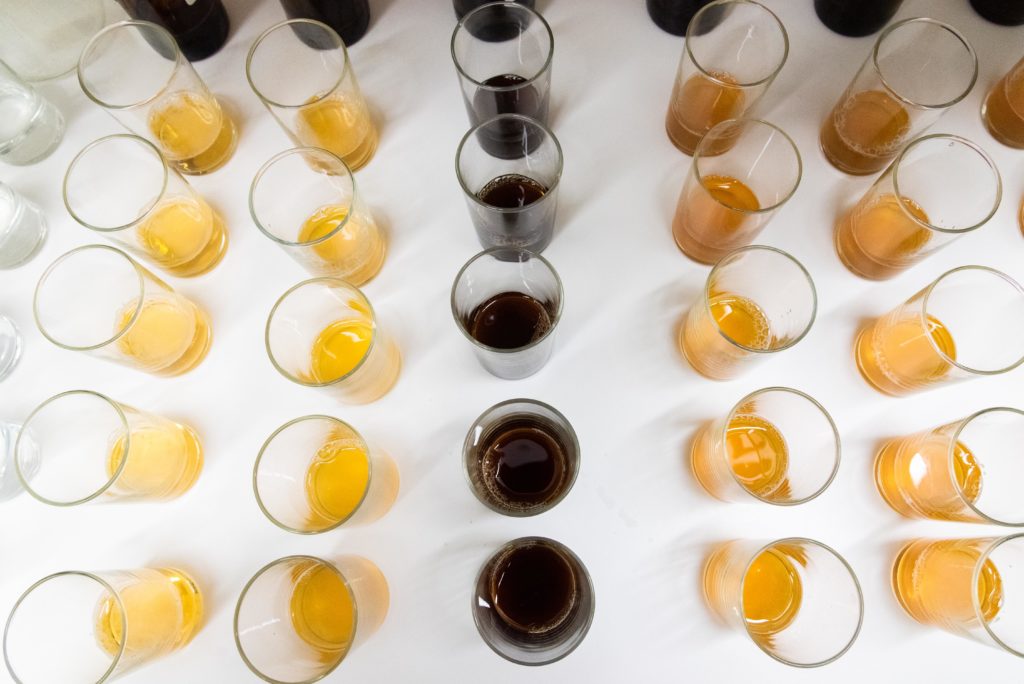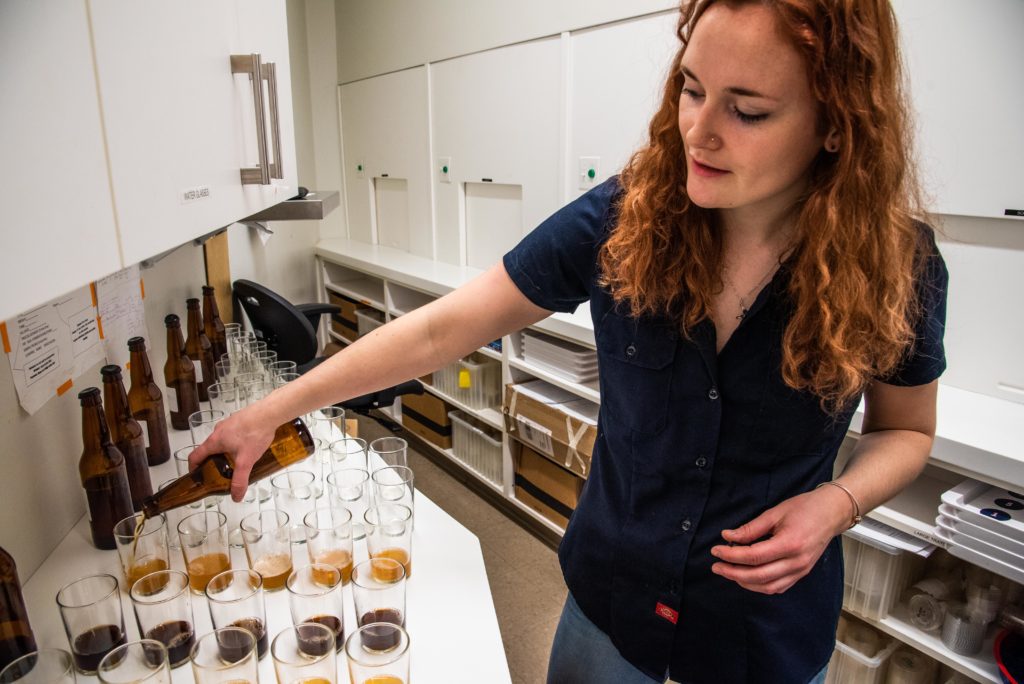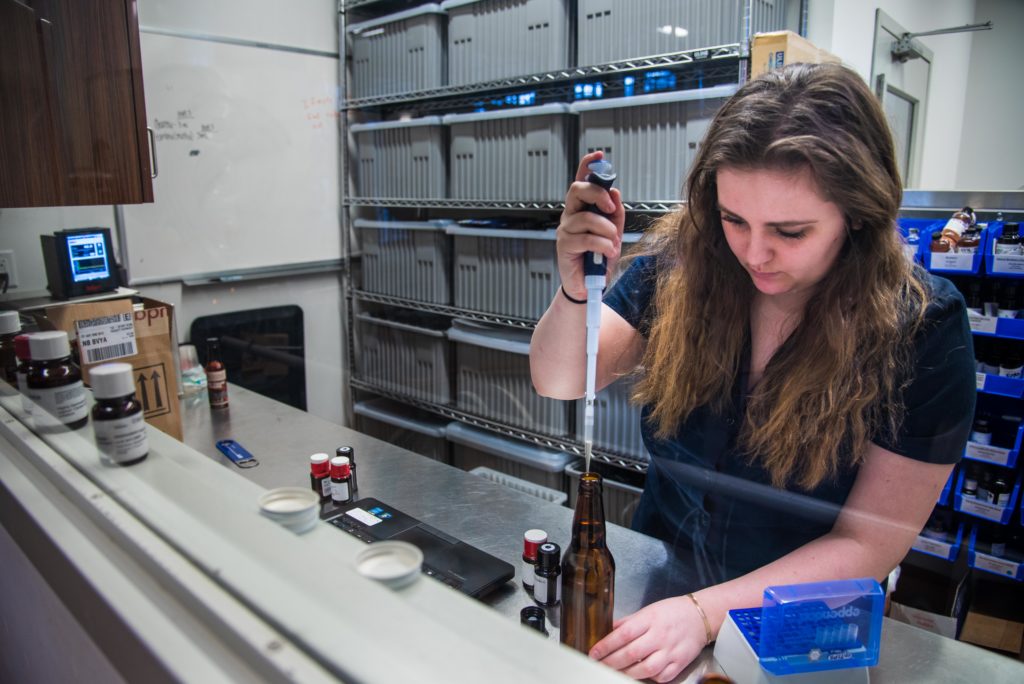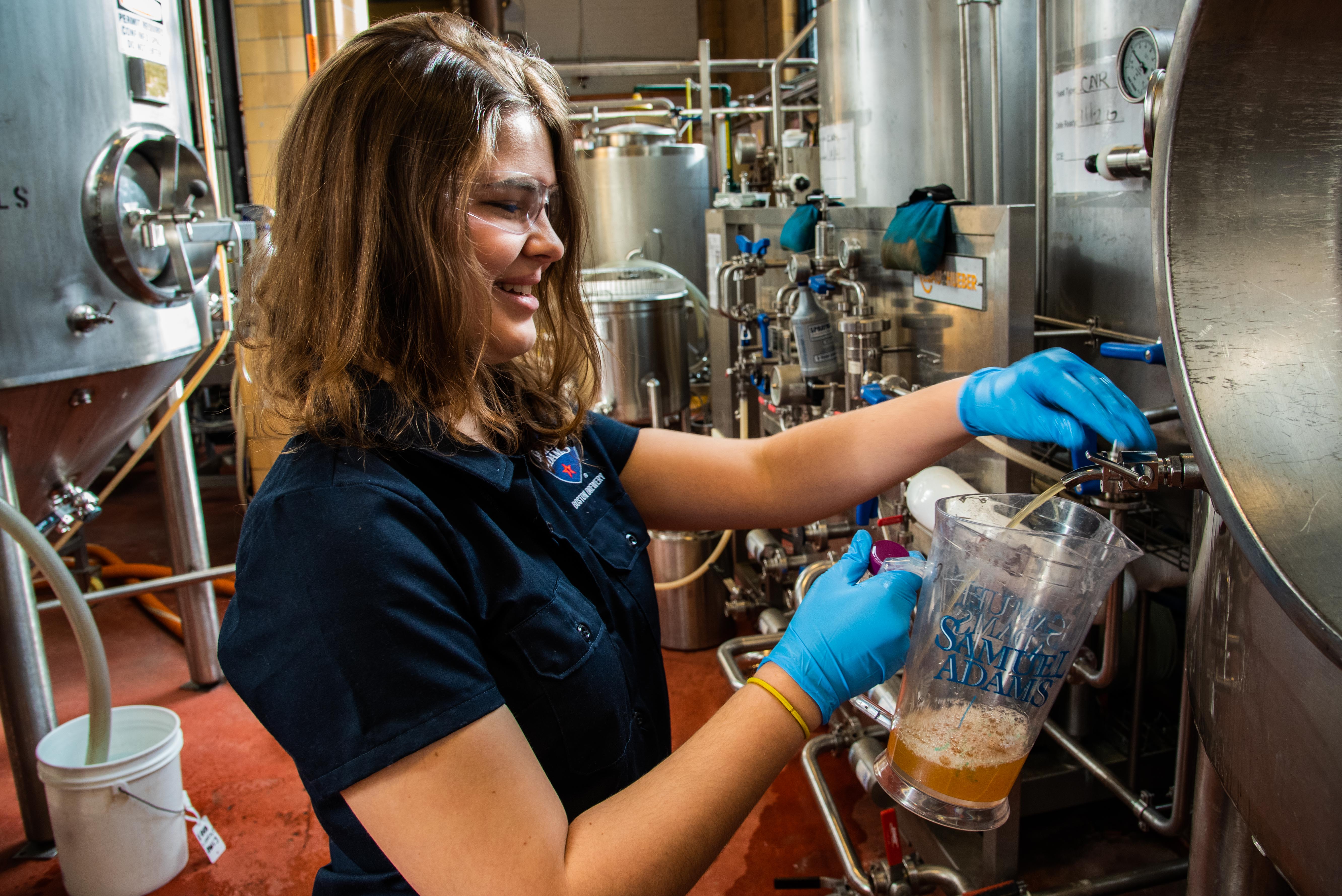At the headquarters of a Boston staple in Jamaica Plain, three College of Science students find themselves surrounded by beer. This is serious work.
They’re on co-op at Boston Beer Company, working at the Research and Development Brewery. Bostonians may be familiar with the BBC brand and the brews they produce, but these students aren’t creating the local flavors consumers are accustomed to. These recipes are more exclusive and are either sold in the on-site taproom, the occasional restaurant, or sent to a limited number of festivals.
That doesn’t mean these ales will never make it into the mainstream. Other breweries will occasionally take on the recipes as their own and distribute them commercially. In fact, every beer in Sam Adam’s history, with the exception of Boston Lager, got its start in Jamaica Plain.

Photo by Tim Briggs
Sometimes in order to succeed, the brews produced here need a measure of luck, which is something Psychology ’20 student Rebecca Conway can relate to. She can’t believe this is her first co-op, and wonders if the next one will even come close to this experience.
“I feel like I might have made a mistake because my next co-op isn’t going to be like this,” said Conway on her time at the brewery. Conway had long held an interest in beer, having previously attended bartending school. While it served as a primer to the pour, she felt the course fell short on quenching her thirst for beer knowledge.
“All they talked about in bartending school was ‘yeah, so that’s beer, you pour it at a forty-five degree angle from the tap and that’s all you need to know,’ but that’s not what I want to know about it.” After finding this co-op, Conway knew it would be a natural fit, allowing her to continue her education and journey into the world of beer.
Her interest in beer mixes well with her undergraduate classwork in psychology, where she works in the sensory lab and runs consumer testing sessions. Conway tests many of the flavors that are added to beers, helping to narrow down what each flavor actually tastes like and what feelings they evoke in tasters.
“Say we’re looking for a blueberry reference. You might want baked blueberry, blueberry muffin, or fresh blueberry. I’ll work on narrowing it down in terms of flavor but also in terms of amount,” said Conway.
Her position also gives her the chance to design her own research project. Her favorite beer is Octoberfest, so as a passion project, she’s wanted to analyze consumer behavior to determine if seasons affect demand for seasonal beers. Conway said she wanted to “do something with consumer testing where I can get a view of what people are thinking and their opinions.”
Conway works closely with Biology ’19 Lily Flynn, a fellow sensory lab co-op. Flynn’s interest in food science brought her to Sam Adams, where she runs taste testing with new employees.

Lily Flynn, Biology ’19, works as a sensory lab co-op at the Boston Brewery Company. Photo by Tim Briggs
Tasters require six months of training before they’re handed a pint, and it’s for good reason. They’re tasked with comparing the flavors, colors, textures, smells, and appearance of beverages in a room which is sound-proofed and painted white for an objective experience.
Flynn has been able to design her own research project as well. Asking the question of how alcohol content affects shelf life, she transfers the brews from keg to laboratory and cooks the beers with a technique called “abuse testing.” After the treatment, she determines if their alcohol levels helped protect the beer or made it degrade faster.
Having worked together for some time, Flynn can rely on her fellow BBC co-ops to work smart and get things done. She feels that she’s had opportunity to grow and achieve much more than previous jobs she’s held.
Elizabeth Curtis, Biology ’19, found similar independence in her role in the Quality Assurance Lab, where she monitors beers as they move through the brewing process. Using lab skills she learned in classes and new knowledge gained on the job, Curtis has thrived at Boston Beer. She has found the brewery to be a great environment to expand her skills, noting that “it’s a good opportunity to learn from others who are happy to teach you.”
On her previous co-op, where she worked researching bees in Belgium, Curtis was more oriented to field work. “I was out and about, working with someone else, catching bees, running through the fields of Belgium,” she said, expressing how fondly she remembered the research aspects of that job.

Rebeca Conway, Psychology ’20, tests flavors in various beers as part of her co-op in the sensory lab. Photo by Tim Briggs
Though she’s spending more time in a lab at Boston Beer, she found parts of her work that run parallel to her desire for hands-on research.
For example, one of her daily duties is to collect samples from two-story tall vats. To prevent any impurities and before pulling the beer, Curtis sterilizes the taps with isopropyl alcohol, which is followed by a quick burn from a blowtorch.
Curtis will take the samples from these vats to make sure they are consistent across each brew. Like Flynn, she’s found attention to detail to be key.
“As the beer moves through different stages of the process, you have to get it at each stage,” said Curtis. “Obviously we brew quite a lot of beer so [you have to] make sure you don’t miss something as it changes.”
One thing that all of the co-ops enjoy is a strong Northeastern family tree at Boston Beer. Many alumnae and former co-ops now work full time there, and it’s one of the main reasons these students have had such a great experience.
Learn more about the Boston Beer Company.

